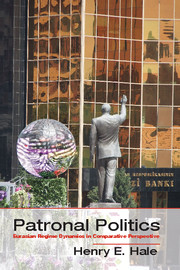Book contents
- Frontmatter
- Contents
- List of Figures
- List of Tables
- Acknowledgments
- Note on Transliteration
- 1 Introduction
- 2 Patronal Politics and the Great Power of Expectations
- 3 Eurasian History as Patronal Politics
- 4 Constitutions, Elections, and Regime Dynamics
- 5 The Emergence of Networks and Constitutions
- 6 The Building of Eurasia’s Great Power Pyramids
- 7 Revolutions and Other Presidential Ousters
- 8 Nonrevolution in Post-Soviet Presidential Systems
- 9 After Revolution
- 10 Patronal Parliamentarism
- 11 Explaining Post-Soviet Regime Dynamics
- 12 Patronal Politics in Global Comparative Perspective
- References
- Index
- References
12 - Patronal Politics in Global Comparative Perspective
Published online by Cambridge University Press: 05 November 2014
- Frontmatter
- Contents
- List of Figures
- List of Tables
- Acknowledgments
- Note on Transliteration
- 1 Introduction
- 2 Patronal Politics and the Great Power of Expectations
- 3 Eurasian History as Patronal Politics
- 4 Constitutions, Elections, and Regime Dynamics
- 5 The Emergence of Networks and Constitutions
- 6 The Building of Eurasia’s Great Power Pyramids
- 7 Revolutions and Other Presidential Ousters
- 8 Nonrevolution in Post-Soviet Presidential Systems
- 9 After Revolution
- 10 Patronal Parliamentarism
- 11 Explaining Post-Soviet Regime Dynamics
- 12 Patronal Politics in Global Comparative Perspective
- References
- Index
- References
Summary
In considering how the preceding analysis relates to the rest of the world, one can think of the post-Soviet countries as providing something like a pristine context in which to study the fundamental characteristics of patronal politics. It is pristine in the sense that it is unencumbered by certain other factors that can be present in other parts of the world but strongly shape how patronal politics plays out, factors such as a realistic near-term chance of joining the European Union. The preceding chapters have shown that patronal politics does function according to a characteristic logic, one distinct from how politics functions in less patronalistic contexts like those in contemporary Norway or Canada. And since pervasive patronalism is much more common in human history than its absence, including today, the former Soviet world can serve as a useful “baseline” for understanding patterns of real politics that we find in other countries, directing our attention to factors like EU prospects that might shape or alter these baseline patterns in different nations or regions. In this global comparative perspective, at least some of the factors that Chapter 11 concluded were unimportant in accounting for variation within the post-Soviet space now take on more significance as explanations as to how patronal politics might function somewhat differently in other parts of the world.
This final chapter turns to such a global analysis, showing how the logic presented here – factoring in certain contextual variables – can account for regime dynamics in the rest of the postcommunist world. This includes Serbia’s democratic breakthrough in 2000, which follows a surprisingly similar “short regime cycle” pattern that has largely been overlooked. It also identifies large-scale factors that have helped tip Latin America’s patronal polities toward sustained competing-pyramid politics, but that have produced more mixed results (often quite similar to post-Soviet patterns) in sub-Saharan Africa, Asia, and the Middle East. Indeed, the logic of patronal politics has important implications for how we might understand the series of events now widely known as the Arab Spring. The chapter then identifies a broader comparative research agenda and turns the global analysis back to the post-Soviet states, examining whether these countries might over a much longer period begin to look more like other parts of the world, such as the state failure of Somalia, the open access society of Sweden, the patronal democracy of the Philippines, or the long-term political closure of China.
- Type
- Chapter
- Information
- Patronal PoliticsEurasian Regime Dynamics in Comparative Perspective, pp. 455 - 488Publisher: Cambridge University PressPrint publication year: 2014
References
- 6
- Cited by



